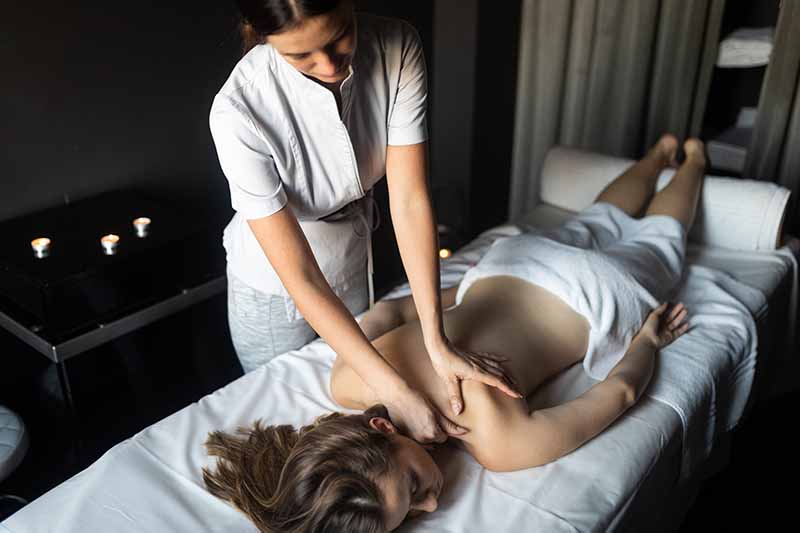
Touch deprivation has become a rampant problem. Here’s how spas can support people suffering from it.
As the world does its best to return to normal and people start travelling and visiting spas and wellness businesses again, there is an urgency for human touch. Touch is a human need and we’ve been missing it.
Whether you’re accustomed to getting a lot of it may depend on where you live. People in some countries touch each other a lot more than others. In the 1960s, psychologist Sidney Jourard studied conversations between two friends sitting in cafes in different parts of the world and found that: In England, the friends didn’t touch each other at all. In the United States, they touched each other twice. In France, they touched each other 110 times per hour. In Puerto Rico, they touched each other 180 times. So, maybe how much people miss it will depend on how accustomed they were to touch before the pandemic. But we can conclude that, no matter where you live, people are desperately missing touch and will be seeking it out.
Touch deprivation increases negative health outcomes
Touch deprivation goes by many names – touch starvation, touch depression, affection deprivation, touch hunger, or skin hunger — and has been discussed at length in the media recently, but the science isn’t new. Nor is it a trivial concern. In the 1990s, scientists traveled to Romania to study sensory deprivation of children in understaffed orphanages. They reportedly found that the touch-deprived children showed significantly lower growth development than children who were not touch deprived.
According to the Texas Medical Centre, “Touch starvation increases stress, depression and anxiety, triggering a cascade of negative physiological effects. The body releases the hormone cortisol as a response to stress, activating the body’s “flight-or-fight” response. This can increase heart rate, blood pressure, respiration and muscle tension, and can suppress the digestive system and immune system—increasing the risk of infection.”
The pandemic has brought an epidemic of touch starvation to the forefront. Spas are well positioned to meet that head on with massage therapy, body treatments, facials, and signature services. This is something to communicate to your guests: that it’s OK to need human touch and that your team members are there to provide it.
Touch has multiple physical and mental health benefits
Touch can even help people fight off infection and disease. As mentioned above, touch deprivation can increase risk of infection. And being touched can reduce that risk. A study of healthy adults examined the roles of perceived social support and received hugs in buffering against susceptibility to infectious disease. Participants were exposed to a virus that causes a common cold and monitored in quarantine to assess infection and illness signs. The researchers found that “Among infected participants, greater perceived support and more frequent hugs each predicted less severe illness signs. These data suggest that hugging may act as an effective means of conveying support.”
Massage shows similar benefits against illness. Tiffany Field, director of University of Miami School of Medicine’s Touch Research Institute, told Greater Good Magazine, “We found that massage actually increases natural killer cells. Natural killer cells are the front lines of the immune system. They kill viral cells, bacteria cells. We found it first in men who had HIV, and then we studied adolescents who had HIV and found the same results. Then we studied breast cancer and again found an increase in natural killer cells. We think that the reason that happens is because we’re knocking down cortisol levels, the body’s culprit stress hormone. Cortisol kills natural killer cells, and so if we can reduce the stress hormones, we can save natural killer cells.”
Touch has emotional and cognitive benefits
But wait. There’s more. Touch also has emotional and cognitive benefits
In another study. Field examined two groups of elderly participants. One group received regular social visits that included only conversation and the other group received social visits that also included massage and conversation. The second group showed more emotional and cognitive benefits than the first.
According to the New Yorker, “Field has found similar gains in both premature and full-term infants, pregnant women, children and adults with chronic pain conditions or emotional problems, and healthy adults.” Just 15 minutes of touch is connected to enhanced growth and weight gain in children as well as emotional, physical, and cognitive improvements in adults.
The best kind of touch includes massage therapy
The research on the benefits of touch goes on. Studies show that touch is associated with increased feelings of trust and safety, reduced heart rate and blood pressure, reduced pain, and release of oxytocin (“the love hormone”) and serotonin.
Massage, obviously, can play a big role.
Field told Greater Good that holding hands, hugging, and cuddling are all “pretty good” but that more pressure is associated with more benefits. She said, “Light stroking is a bit aversive to most people because they feel like they’re being tickled. … Heart rate decreases when you’re getting moderate pressure. Heart rate increases when you’re getting light pressure. Same with blood pressure.”
Facials, manicures, and any spa treatment that includes touch may be beneficial. (Regular hand massage may help ease pain, increase hand strength, and reduce feelings of stress and anxiety.)
Physical contact is a key element of a healthy life and promotes wellbeing. Let’s get the word out.
 Is finding and retaining talent a challenge at your spa? Get insights from industry leaders, including Nigel Franklyn, Lynne McNees, Verena Lasvigne-Fox, and Daisy Tepper when you download our report: What will it take to fix the spa industry’s staffing shortage? .
Is finding and retaining talent a challenge at your spa? Get insights from industry leaders, including Nigel Franklyn, Lynne McNees, Verena Lasvigne-Fox, and Daisy Tepper when you download our report: What will it take to fix the spa industry’s staffing shortage? .
Spa Executive is published by Book4Time, the leader in guest management, revenue and mobile solutions for the most exclusive spas, hotels, and resorts around the globe. Learn more at book4time.com.




I had the privilege of writing a letter for this proposal.